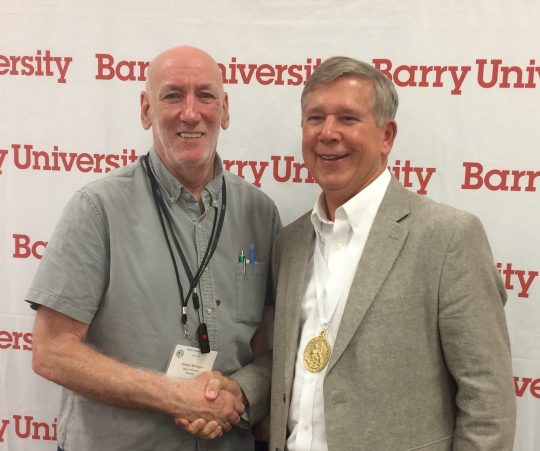Richard Turner Named Florida Academy of Sciences 2018 Medalist
Fourth Florida Tech Faculty Member
to be Honored Since 1963
MELBOURNE, FLA. — Richard Turner, professor emeritus of biological sciences at Florida Institute of Technology, a respected scholar of Florida invertebrates and a guiding force at the Florida Academy of Sciences, has been awarded the academy’s highest honor, the FAS Medal.
Joining George Maul (2016), Terry Oswalt (2010) and John Trefry (2002), Turner is the fourth Florida Tech faculty member to receive one of Florida’s highest academic honors since the academy started awarding the medal in 1963.
“It has been an honor to serve science and scientists in Florida through my participation and leadership in the Academy over these 45 years,” Turner said.
The academy awards one medal annually to a Florida resident who has “contributed in an outstanding manner to the promotion of scientific research, to the stimulation of interest in the sciences, or to the diffusion of scientific knowledge.” Candidates may be research scientists, philanthropists and educators, journalists, science fair coordinators or members of industry, government or other organizations.
“As an FAS council member since 2001, I have worked closely with Dr. Turner in a wide variety of projects and administrative tasks. I have always been impressed with his respectful and thoughtful approach to problem-solving in management,” said Jeremy Montague of Barry University, past president of the academy and chair of its Honors Committee. “Whether in dealing with budgets, facilities or personnel, he always comes up with reasonable solutions without ruffling the feathers of others.”
Noting Turner’s third-degree black belt in American Kenpo karate, Montague added, “I think his intensive training in martial arts has conditioned him well to perform calmly and quietly under pressure.”
Turner, the academy’s 56th medalist, was recognized at a banquet March 9 during the group’s annual meeting at Barry University in Miami Shores.
A native of Brockton, Mass., Turner earned bachelor and master’s degrees in zoology from the University of Maine and came to Tampa soon thereafter, where he earned his doctorate in biology at the University of South Florida in 1977. He headed east to work as an assistant professor of biological sciences at Florida Tech starting in 1976, a partnership that would help shape the institution and the academic community over the next 40 years. He later chaired the Marine Biology program at Florida Tech, served as associate department head for undergraduate programs in biological sciences and then director, and was named full professor in 2016. In May 2017, Turner was named professor emeritus.
Beyond the thousands of students he has helped, Turner’s own research into a variety of Florida invertebrates – mainly the marine animals such as sea stars, sea urchins and sand dollars known as echinoderms – has illuminated the phylum Echinodermata by, among other achievements, describing a new species of sea star and sea cucumber, and two new species of brittle star from Florida. He is also an authority on the Florida apple snail.
His impact in the Biology Department at Florida Tech may only be exceeded by his impact in the Florida Academy of Sciences.
His first interaction with FAS was in 1974, when he was co-author of a paper presented at its annual meeting. Over the ensuing four-plus decades, Turner has presented or co-authored an additional 44 oral and poster papers at FAS meetings.
His involvement went well beyond presentations, however.
He became chair-elect of the academy’s Biological Sciences Section in 1977, and he later was charged with organizing annual meeting programs as program chair.
He served as associate editor and interim editor (twice) of the academy’s magazine, Florida Scientist, even as he chaired the editor search committee; as chair of the Awards Committee; and, across two terms, as president of the academy during its 50th anniversary year, 1985-86, and its 75th anniversary year, 2010-11.
Hamid Rassoul, at the time dean of the College of Science, and Michael Grace, who was then associate dean, wrote in their nomination of Turner, “Some of his most important and long-lasting work was accomplished during his two terms as president.”
Those include his promotion of the establishment of the Florida Endowment for the Sciences, for which Turner instituted a spending policy and oversaw the first annual distributions to support the purposes and values of the academy.
In both of his presidential terms, Turner and the Florida Academy of Sciences Council pursued action against state-level attempts to introduce teaching of religious-based “science” in elementary and secondary schools, with the academy issuing strong statements to the governors and state legislatures in support of scientifically based material on evolution.
In his second term, from 2009 to 2011, Turner established a budgetary process for accountability of academy finances, a critical process that had not been addressed since the early 1990s. And he strengthened procedures for the Awards Committee, ultimately producing a 50-page manual to guide the awards chair.
“Turner hopes to serve a third term as president in 2036 (the Academy’s 100th anniversary) if his health remains good in old age!” his nominators wrote.
Turner is a life member of numerous organizations, including the American Microscopical Society, the Honor Society of Phi Kappa Phi, the Scientific Research Society of Sigma Xi and the Society for Integrative and Comparative Biology, and a charter member of the Marine Resources Council of East Florida.
###





